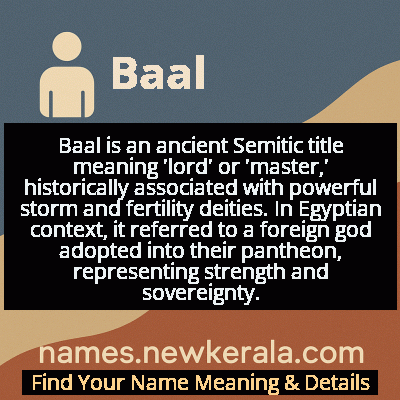Baal Name Meaning & Details
Origin, Popularity, Numerology Analysis & Name Meaning of Baal
Discover the origin, meaning, and cultural significance of the name BAAL. Delve into its historical roots and explore the lasting impact it has had on communities and traditions.
Name
Baal
Gender
Male
Origin
Egyptian
Lucky Number
7
Meaning of the Name - Baal
Baal is an ancient Semitic title meaning 'lord' or 'master,' historically associated with powerful storm and fertility deities. In Egyptian context, it referred to a foreign god adopted into their pantheon, representing strength and sovereignty.
Baal - Complete Numerology Analysis
Your Numerology Number
Based on Pythagorean Numerology System
Ruling Planet
Neptune (Ketu)
Positive Nature
Intuitive, analytical, spiritual, and inquisitive.
Negative Traits
Secretive, reserved, aloof, and can be overly critical.
Lucky Colours
Green, yellow.
Lucky Days
Monday.
Lucky Stones
Cat’s eye, moonstone.
Harmony Numbers
1, 5, 6.
Best Suited Professions
Scientists, researchers, spiritual leaders, detectives.
What People Like About You
Depth of knowledge, analytical skills, spirituality.
Famous People Named Baal
Baal
Ancient deity
Primary god of the Canaanite pantheon, worshipped as storm and fertility deity
Baal I
Phoenician King
King of Tyre who maintained Phoenician independence during Assyrian expansion
Baal II
Phoenician King
Successor to Baal I, continued Tyrian sovereignty and trade dominance
Name Variations & International Equivalents
Click on blue names to explore their detailed meanings. Gray names with will be available soon.
Cultural & Historical Significance
The worship of Baal in Egypt reflects the complex religious syncretism of the ancient world. Egyptian representations typically show Baal as a smiting god similar to Egyptian deities like Seth, emphasizing his warrior aspects. The adoption of Baal into Egyptian religion occurred primarily during the 18th and 19th dynasties when Egyptian influence extended deep into Canaanite territories. This cultural exchange illustrates how conquest and trade facilitated the movement of religious ideas across ancient civilizations, with deities being reinterpreted to fit local religious frameworks while retaining their core attributes.
Extended Personality Analysis
As a divine name, Baal carries connotations of power, authority, and natural force. Those named after this deity might be perceived as commanding, charismatic leaders with strong presence. The storm god association suggests dynamic energy, unpredictability, and transformative power - capable of both destructive fury and life-giving rain. In modern psychological interpretation, the name evokes qualities of ambition, dominance, and natural leadership, tempered by the responsibility that comes with great power.
The fertility aspect of the original deity also suggests creative potential and the ability to nurture growth and abundance in various endeavors. However, the name's mythological background includes themes of conflict, seasonal death and rebirth, suggesting someone who experiences significant transformations throughout life. The association with both creation and destruction implies a complex personality capable of great achievements but also potential for dramatic upheavals. In contemporary terms, the name suggests someone who commands respect, possesses strong willpower, and has the capacity to influence their environment significantly, for better or worse.
Modern Usage & Popularity
In contemporary times, Baal is rarely used as a personal name due to its strong religious and mythological associations. It appears primarily in academic contexts, historical fiction, and fantasy media. The name maintains a niche presence in neopagan and occult communities where ancient deities are sometimes honored through naming practices. Its usage remains controversial in Abrahamic religious traditions where Baal is often depicted as a false god or demonic figure. Modern appearances are almost exclusively in fictional contexts, particularly in fantasy literature, video games, and television shows dealing with mythological themes. The name's popularity has seen no significant trends in birth registries, remaining consistently rare throughout the 20th and 21st centuries.
Symbolic & Spiritual Meanings
Symbolically, Baal represents raw natural power, sovereignty, and the cycle of death and rebirth through his mythology of seasonal death and resurrection. The name embodies the concept of divine kingship and the connection between earthly rulers and cosmic forces. As a storm deity, Baal symbolizes both destructive and life-giving aspects of nature - the thunder that destroys and the rain that nourishes. The name also carries themes of conflict and triumph, reflecting the mythological battles between Baal and other deities like Yam (Sea) and Mot (Death). In modern symbolic interpretation, Baal represents the untamed aspects of nature and the primal forces that humanity both fears and depends upon for survival, serving as a powerful metaphor for the uncontrollable elements of existence that require respect and understanding rather than domination.

